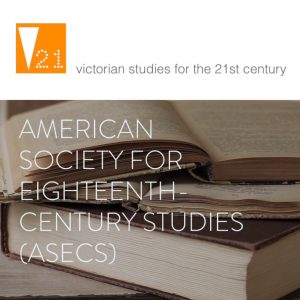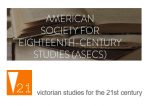 For the 2018 American Society for Eighteenth-Century Studies (ASECS) conference program, Katarzyna Bartoszynska and Eugenia Zuroski circulated the following call for contributions to a roundtable responding to the V21 Collective’s intervention in nineteenth-century studies and the possibilities it presented for reflecting on current problems and critical approaches in eighteenth-century studies:
For the 2018 American Society for Eighteenth-Century Studies (ASECS) conference program, Katarzyna Bartoszynska and Eugenia Zuroski circulated the following call for contributions to a roundtable responding to the V21 Collective’s intervention in nineteenth-century studies and the possibilities it presented for reflecting on current problems and critical approaches in eighteenth-century studies:
Launched in 2015, the V21 Collective aims to invigorate the field of Victorian Studies by calling for more “speculative and synthetic methods”; new formalisms and presentisms; and a willingness to theorize. Critiquing the tendency towards positivist historicism, V21 urges a renewed engagement in the question of how we relate to the past. It also interrogates the forms of institution that structure the field, modeling alternative approaches to collective thinking, by, for instance, assembling Book Collations in place of the standard book review.
This roundtable asks whether C18 studies are in need of a similar movement, inviting us to take stock of our own disciplinary habits and formations. What is our relationship to historicism, to form, to theory? What kinds of institutional frameworks and platforms do we use? Do C18 studies share the problems that V21 finds in Victorian studies, or do we model alternative approaches? Which commitments—disciplinary, theoretical, political, methodological—are we prepared to renew, and which to rethink?
We invite brief reflections to initiate a discussion of how we understand the affordances of C18 scholarship in the 21st century. We strongly encourage PhD candidates and junior scholars, as well as more senior colleagues, to submit abstracts.
The roundtable featured brief talks by five scholars—Stephanie Insley Hershinow, Travis Lau, Sandra Macpherson, Jonathan Kramnick, and Laura E. Martin—plus a response from Anna Kornbluh on behalf of V21. We have gathered four of the five talks here, with a reflection on the conversation by the co-chairs.

